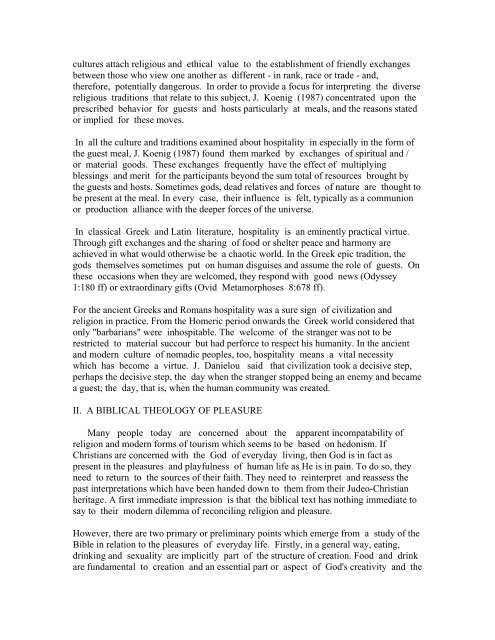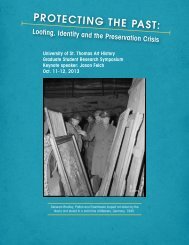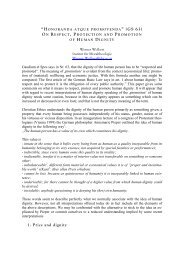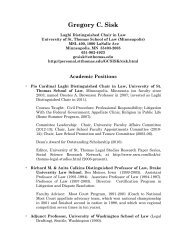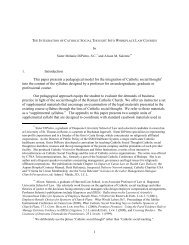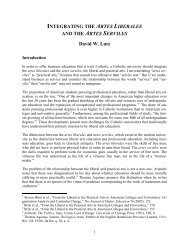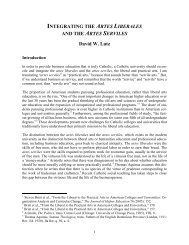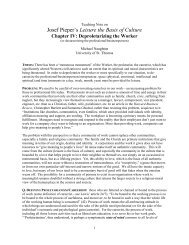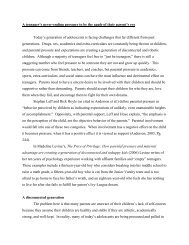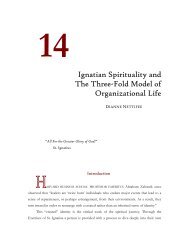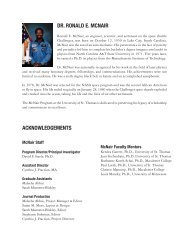Jim Spillane, SJ - University of St. Thomas
Jim Spillane, SJ - University of St. Thomas
Jim Spillane, SJ - University of St. Thomas
Create successful ePaper yourself
Turn your PDF publications into a flip-book with our unique Google optimized e-Paper software.
cultures attach religious and ethical value to the establishment <strong>of</strong> friendly exchanges<br />
between those who view one another as different - in rank, race or trade - and,<br />
therefore, potentially dangerous. In order to provide a focus for interpreting the diverse<br />
religious traditions that relate to this subject, J. Koenig (1987) concentrated upon the<br />
prescribed behavior for guests and hosts particularly at meals, and the reasons stated<br />
or implied for these moves.<br />
In all the culture and traditions examined about hospitality in especially in the form <strong>of</strong><br />
the guest meal, J. Koenig (1987) found them marked by exchanges <strong>of</strong> spiritual and /<br />
or material goods. These exchanges frequently have the effect <strong>of</strong> multiplying<br />
blessings and merit for the participants beyond the sum total <strong>of</strong> resources brought by<br />
the guests and hosts. Sometimes gods, dead relatives and forces <strong>of</strong> nature are thought to<br />
be present at the meal. In every case, their influence is felt, typically as a communion<br />
or production alliance with the deeper forces <strong>of</strong> the universe.<br />
In classical Greek and Latin literature, hospitality is an eminently practical virtue.<br />
Through gift exchanges and the sharing <strong>of</strong> food or shelter peace and harmony are<br />
achieved in what would otherwise be a chaotic world. In the Greek epic tradition, the<br />
gods themselves sometimes put on human disguises and assume the role <strong>of</strong> guests. On<br />
these occasions when they are welcomed, they respond with good news (Odyssey<br />
1:180 ff) or extraordinary gifts (Ovid Metamorphoses 8:678 ff).<br />
For the ancient Greeks and Romans hospitality was a sure sign <strong>of</strong> civilization and<br />
religion in practice. From the Homeric period onwards the Greek world considered that<br />
only "barbarians" were inhospitable. The welcome <strong>of</strong> the stranger was not to be<br />
restricted to material succour but had perforce to respect his humanity. In the ancient<br />
and modern culture <strong>of</strong> nomadic peoples, too, hospitality means a vital necessity<br />
which has become a virtue. J. Danielou said that civilization took a decisive step,<br />
perhaps the decisive step, the day when the stranger stopped being an enemy and became<br />
a guest; the day, that is, when the human community was created.<br />
II. A BIBLICAL THEOLOGY OF PLEASURE<br />
Many people today are concerned about the apparent incompatability <strong>of</strong><br />
religion and modern forms <strong>of</strong> tourism which seems to be based on hedonism. If<br />
Christians are concerned with the God <strong>of</strong> everyday living, then God is in fact as<br />
present in the pleasures and playfulness <strong>of</strong> human life as He is in pain. To do so, they<br />
need to return to the sources <strong>of</strong> their faith. They need to reinterpret and reassess the<br />
past interpretations which have been handed down to them from their Judeo-Christian<br />
heritage. A first immediate impression is that the biblical text has nothing immediate to<br />
say to their modern dilemma <strong>of</strong> reconciling religion and pleasure.<br />
However, there are two primary or preliminary points which emerge from a study <strong>of</strong> the<br />
Bible in relation to the pleasures <strong>of</strong> everyday life. Firstly, in a general way, eating,<br />
drinking and sexuality are implicitly part <strong>of</strong> the structure <strong>of</strong> creation. Food and drink<br />
are fundamental to creation and an essential part or aspect <strong>of</strong> God's creativity and the


